Donald J. Robertson's Blog, page 11
November 26, 2024
Watch my Conversation with Ryan Holiday about Socrates and Stoicism
Here’s the video of my recent conversation with Ryan Holiday about Socrates and Stoicism. I travelled down to the Painted Porch bookshop to talk with Ryan in person. Please share with your friends. Thanks for your support!
Stoicism: Philosophy as a Way of Life is a reader-supported publication. To receive new posts and support my work, consider becoming a free or paid subscriber.

Thanks for reading Stoicism: Philosophy as a Way of Life! This post is public so feel free to share it.
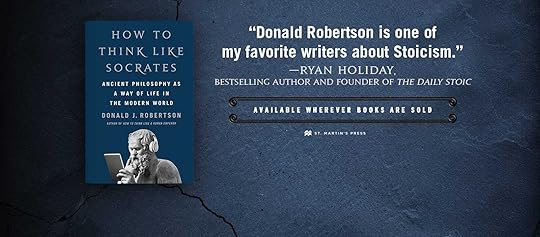
November 23, 2024
Book Launch: How to Think Like Socrates
Listen to our live How to Think Like Socrates book launch from 19th Nov. Phil Yanov was kind enough to send me this recording of the event.
Stoicism: Philosophy as a Way of Life is a reader-supported publication. To receive new posts and support my work, consider becoming a free or paid subscriber.
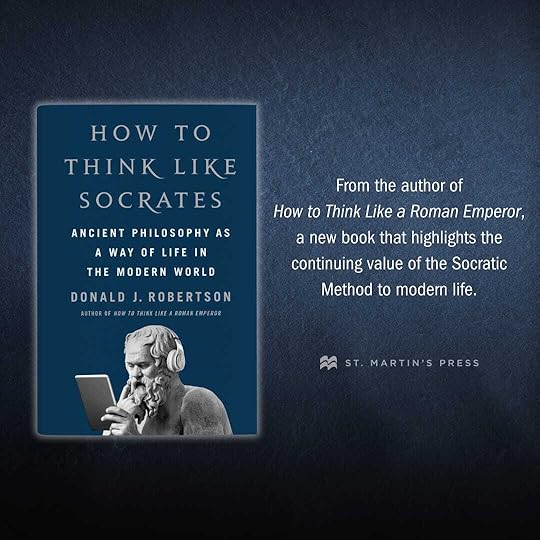
Thanks for reading Stoicism: Philosophy as a Way of Life! This post is public so feel free to share it.
November 20, 2024
Discussing Socrates with Ryan Holiday
I’ve known Ryan for quite a few years now, have contributed a few articles to The Daily Stoic website, and have appeared on his podcast several times. This was the second time this year (!) that I’d travelled down to the Painted Porch bookstore in Bastrop, TX, to meet him for in interview. Ryan and I have spoken before about Marcus Aurelius but this time we had a chance to talk about one of our other philosophical heroes: Socrates.
Stoicism: Philosophy as a Way of Life is a reader-supported publication. To receive new posts and support my work, consider becoming a free or paid subscriber.
You can currently listen to the podcast episode on Spotify or Apple.

How to Think Like Socrates is out now and available in hardback, ebook, and audiobook formats from all good bookstores.

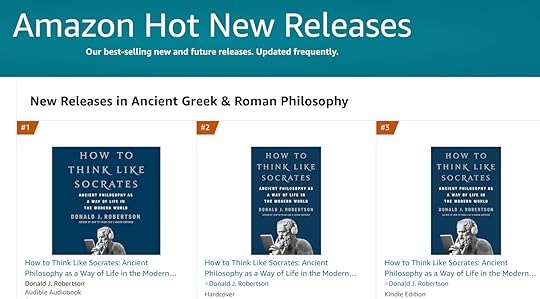
Thanks for reading Stoicism: Philosophy as a Way of Life! This post is public so feel free to share it.
November 19, 2024
Did you order "How to Think Like Socrates"?
How to Think Like Socrates is out now! If you haven’t already ordered your copy, you can get it in hardback, audiobook, or ebook format from Amazon, Barnes and Noble, and all other good book stores.
Here is Your Zoom LinkI just wanted to make sure that everyone who has ordered a copy gets the Zoom link to our book launch / Q&A later today on Zoom. Phil Yanov will be joining us to help manage the event.
Time: Nov 19, 2024 18:00 Eastern Time (US and Canada)
Meeting ID: 871 8866 7495 / Passcode: 191893
Stoicism: Philosophy as a Way of Life is a reader-supported publication. To receive new posts and support my work, consider becoming a free or paid subscriber.
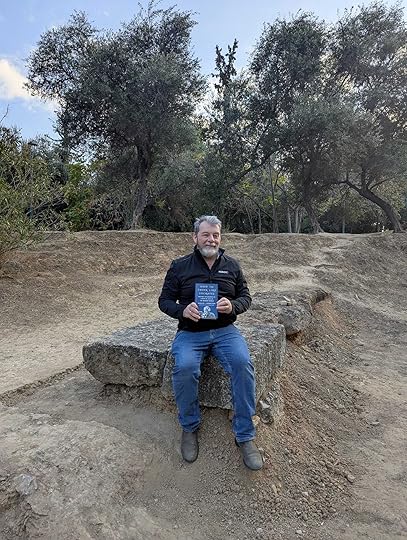
Thanks for reading Stoicism: Philosophy as a Way of Life! This post is public so feel free to share it.
How to Listen to How to Think Like Socrates
At last, I’ve reached the end of one journey… and the beginning of a new one. My latest book, How to Think Like Socrates, was released today in the US/Canada, and in some other regions.
A practical application of his philosophy to contemporary problems, this book makes the wisdom of Socrates more accessible than ever before. — Barnes & Noble
I remember telling people that it seemed impossible to write a book “like How to Think Like a Roman Emperor but about Socrates” — then I changed my mind. I just kept asking myself what my seventeen year old self would want to read. And it actually began to seem like a sort of injustice to me that he didn’t have a more engaging introduction to the life and thought of history’s greatest philosopher! So this is my gift to him, and I just hope other people have the same tastes, and that it appeals to them too.
 The first reviews are in! Hector says it’s riveting.
The first reviews are in! Hector says it’s riveting.Actually, for me, one of the final steps in the process was narrating the audiobook at the recording studio of Patrice D’Aragon in Montreal. My friend and editor, Lalya Lloyd, is a classicist, and we went over the pronunciation of 254 Greek words together. (I learned a little ancient Greek when I first studied Plato, at university, over 25 years ago, but since then I’ve mainly been learning modern Greek — so sometimes I have to be reminded not to get modern and ancient pronunciations mixed up!)
Stoicism: Philosophy as a Way of Life is a reader-supported publication. To receive new posts and support my work, consider becoming a free or paid subscriber.
 Patrice had me strap a pillow to my belly to conceal any rumbling
Patrice had me strap a pillow to my belly to conceal any rumblingYou can now listen to an audio sample from the finished book on Audible. I have a philosophy when it comes to writing that I call “audio first” — I think of myself primarily as writing the script for an audiobook not a print book. (A good audiobook normally makes a good print book but it doesn’t always work the other way round.)
Part of the challenge with recording this book was that it’s quite dramatic, and involves a lot of dialogue. So, although I’m no voice actor, my audio director, Gordon Rothman, encouraged me to put a bit more emotion and character than normal into my narration. Even though it’s (sort of) a nonfiction book — there’s a very strong narrative element.
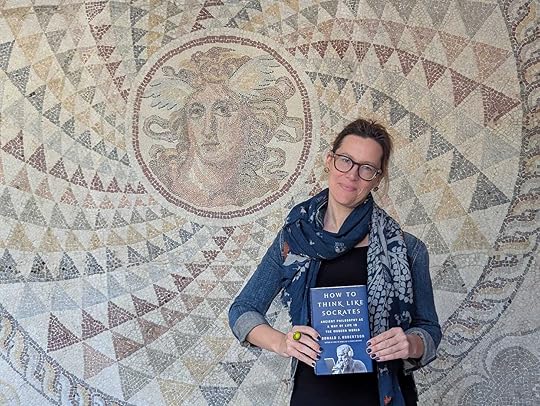 Lalya at the National Archeological Museum in Athens, with the book she edited!
Lalya at the National Archeological Museum in Athens, with the book she edited!Our initial feedback from advance reader copies (ARCs) of the book have been positive. You can already read the early reviews on Goodreads.
In the past, I’ve found ratings from readers who subsequently buy the book to be higher. ARC readers sometimes don’t know what to expect whereas my readers are mostly looking for this type of book. When I first proposed How to Think Like a Roman Emperor my publisher was slightly confused by the idea of blending together three different genres: history, philosophy, and self-help. Would anyone actually want to read a cross-genre / interdisciplinary mashup? Books like that didn’t really exist. We were relieved, though, to discover that there an audience for them existed! Although it was an unusual idea, in some ways, it seems very natural to me.
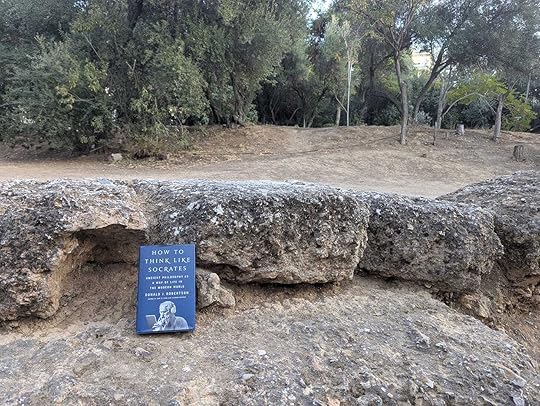
Later today, I’m doing an exclusive book launch / Q&A for those of you who already preordered the book. (You should already have received the Zoom link via email.) I’ve had a lot of feedback from people in response to the recent interview I did about the book with Chris Williamson, which has now been viewed by nearly 100k people. I also flew down to Austin, TX, to record an interview with Ryan Holiday about Socrates, which (I think) will be released this Saturday. Watch out too for my forthcoming audio course on Stoicism and Socrates, for Sam Harris’ Waking Up app, which I’m told is being released in January.
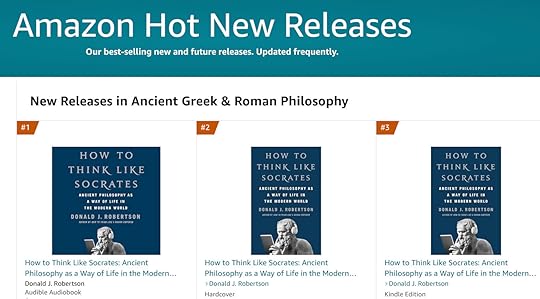
Thanks once again to you all for your support. I hope you enjoy listening to, or reading, How to Think Like Socrates, as much as I enjoyed creating it.
Thanks for reading Stoicism: Philosophy as a Way of Life! This post is public so feel free to share it.
Video: Stoic Coffee Break with Socrates
I recently spoke to Erick Cloward, host of the popular Stoic Coffee Break podcast, about my forthcoming book, How to Think Like Socrates. You can watch the video of our conversation on YouTube or via the embed below.
Stoicism: Philosophy as a Way of Life is a reader-supported publication. To receive new posts and support my work, consider becoming a free or paid subscriber.

Thanks for reading Stoicism: Philosophy as a Way of Life! This post is public so feel free to share it.
November 18, 2024
Book Launch: "How to Think Like Socrates"
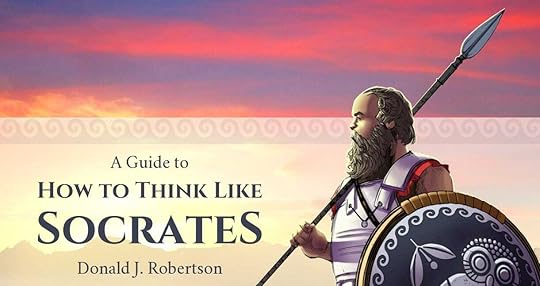
Tomorrow is the US/Canada release date for my new book How to Think Like Socrates, available in hardback, ebook, and audiobook, from St. Martin’s Press, at Amazon, Barnes and Noble, and other good bookstores. You can read advance reviews on Goodreads.
A practical application of his philosophy to contemporary problems, this book makes the wisdom of Socrates more accessible than ever before. — Barnes & Noble
I’ll be holding an online book launch event via Zoom, for everyone who has preordered a copy — 19th Nov, 6pm eastern time. Just enter your details in this short online form to register for the Q&A session and claim your other rewards.
NB: A recording will be available for playback if you're not able to attend live.
Stoicism: Philosophy as a Way of Life is a reader-supported publication. To receive new posts and support my work, consider becoming a free or paid subscriber.
List of FreebiesJoin me for an exclusive live Book Launch / Q&A session on Zoom where we'll dive deeper into the book.
You will also receive a link to download our illustrated PDF booklet titled A Guide to How to Think Like Socrates, with original artwork by Stan Yak, and graphic design by Sara Beth Haring.
Enjoy 6 months of full access to my Substack newsletter, packed with insights and exclusive content.
Gain access to bonus audio and video interviews, offering unique perspectives on the book.
Thanks for reading Stoicism: Philosophy as a Way of Life! This post is public so feel free to share it.
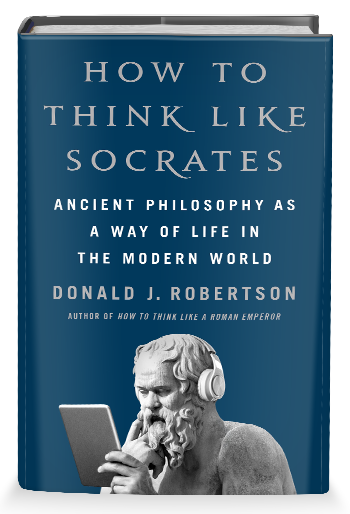
November 17, 2024
Who Were the Followers of Socrates?
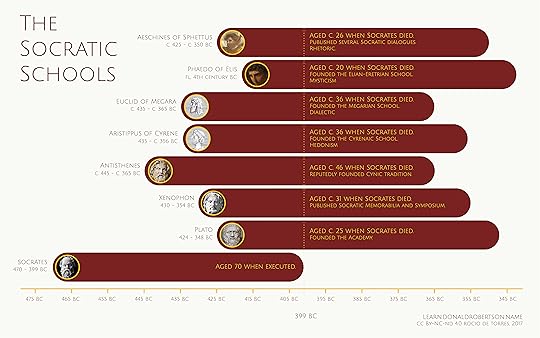
Socrates had many friends and followers. Not all of them went on to become famous philosophers in their own right. However, according to an ancient tradition, ten of them did. It’s a testimony to Socrates’ influence that despite neither leaving behind any philosophical writings himself nor founding a school, so many of his immediate followers went on to found their own distinct schools and to publish important philosophical dialogues.
For example, the 3rd century CE author, Diogenes Laertius, in his Lives and Opinions of Eminent Philosophers, wrote:
Of those who succeeded [Socrates] and were called Socratics the chief were Plato, Xenophon, Antisthenes, and of ten names on the traditional list the most distinguished are Aeschines, Phaedo, Euclides, Aristippus.
Diogenes Laertius doesn’t name the remaining three followers of Socrates who succeeded him by teaching philosophy themselves. However, they are often assumed to include Simon of Athens, the Shoemaker; Crito of Athens, Socrates’ lifelong friend; and Simmias of Thebes, a Pythagorean who featured in Plato’s Phaedo, along with his friend Cebes, both of whom were present at Socrates’ death.
Stoicism: Philosophy as a Way of Life is a reader-supported publication. To receive new posts and support my work, consider becoming a free or paid subscriber.
Socrates’ Three Main Followers
Antisthenes, a close friend of Socrates, and one of his oldest followers. Antisthenes was known for his austere lifestyle. He was the main precursor, and by some accounts even the founder, of the Cynic tradition. He continues to be cited by later authors, down to the time of Marcus Aurelius and beyond, but none of his writings survive today.
Xenophon of Athens, a younger student of Socrates, who became an Athenian general, and a famous author. Many of his dialogues and other writings survive today, including the Memorabilia Socratis and his famous historical account of a military campaign in Persia, called the Anabasis. Zeno, the founder of Stoicism, was reputedly inspired to become a philosopher after reading the second book of the Memorabilia, in which Xenophon depicts Socrates challenging the hedonistic philosophy of Aristippus.
Plato of Athens, one of the youngest students of Socrates, who nevertheless went on to become his most famous successor, and the founder of the Academic school. All thirty-seven of his Socratic dialogues survive today. Plato is generally believed to use Socrates as a mouthpiece for his own ideas, such as the Theory of Forms, from the writings of his middle period onward. The vexed question of how to separate the real Socrates from Plato’s “Socrates” is known by scholars as the Socratic Problem.
Other Distinguished Followers
Aeschines of Sphettus, who wrote at least seven Socratic dialogues, all of which are lost except some important fragments from his Aspasia and Alcibiades.
Phaedo of Elis, a handsome young man who had been captured, enslaved, and forced to work in a brothel, until Socrates persuaded his friends to buy Phaedo and set him free. He was present at Socrates’ death, which is depicted in Plato’s famous dialogues is named the Phaedo after him. He went on to found the Elian school of philosophy.
Euclides of Megara, founder of the once-influential Megarian school, which was known for its emphasis on austere ethics but also its sophisticated logic or dialectics. His most important successor, Stilpo, taught Zeno of Citium, and had an influence on early Stoicism.
Aristippus of Cyrene, the founder of the Cyrenaic school, and early hedonist philosophy, which seems quite at odds with the virtue ethic more-commonly associated with Socrates and his other followers. In the Memorabilia of Xenophon, Socrates is quite critical of Aristippus’ hedonism and looks more favourably on the austere ethic of Antisthenes.
The Three Unnamed Followers
Simon of Athens, a shoemaker in whose shop, in the Agora, Socrates would often meet with his friends to discuss philosophy. Simon was reputedly the first person to write Socratic dialogues, although none of his works survive today. Socrates, and several of his friends, were known for going around barefoot, which makes the notion of them spending their time in a shoe shop appear like satire rather than historical fact. Remarkably, though, during excavations of the Agora, in the ruins of a shoe shop, along with nails used by a cobbler, a fragment of a kylix, or wine cup, was unearthed, which is actually inscribed with the name Simon.
Crito of Athens, was Socrates’ oldest friend. He came from the same suburb as Socrates, Alopece. Crito was a wealthy agriculturalist, and we’re told he was the one who removed Socrates from his family’s workshop, which may mean that he became a sort of patron, funding his philosophical studies. Crito was present at Socrates’ trial and execution. One of Plato’s most famous dialogues, the Crito, is named after him. His four sons were also followers of Socrates. Diogenes Laertius says he wrote 17 dialogues but none of them survive today.
Simmias of Thebes, along with his friend Cebes, were young Pythagorean philosophers, present at Socrates’ death, who feature prominently in Plato’s Phaedo. According to Diogenes Laertius, Simmias was the author of 23 dialogues, although none survive today. Cebes also wrote several philosophical dialogues. One famous text, known as The Tablet of Cebes, survives today, although most scholars believe that it is not authentic but was written in the 2nd century CE.
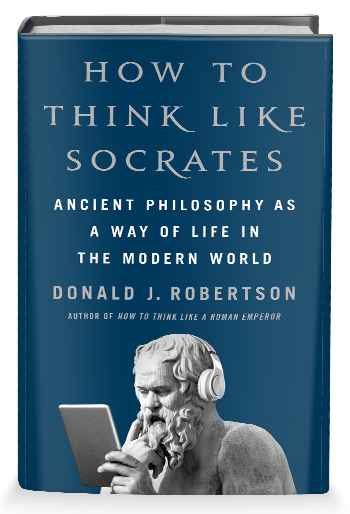
Thanks for reading Stoicism: Philosophy as a Way of Life! This post is public so feel free to share it.
November 14, 2024
Video: Why is Socrates so important?
I recently had an in-depth conversation with Chris Williamson about Socrates for his Modern Wisdom YouTube channel, which reaches nearly 3 million subscribers. Check out the video of our discussion and let me know what you think. Please share the video with your friends!

Stoicism: Philosophy as a Way of Life is a reader-supported publication. To receive new posts and support my work, consider becoming a free or paid subscriber.
Highlights00:00 Why Should We Care About Socrates?
07:50 Philosophy Before Socrates
14:42 Why Socrates Became a Philosopher
21:04 Main Principles of Socrates’ Philosophy
35:42 Why Some Find Socrates Annoying
45:35 Did Socrates Get Involved in Politics?
49:50 Socrates’ View of a Good Life
57:57 Why Socrates Was Executed
1:08:48 Links Between Socrates & Seneca
1:19:40 The Meaning Behind ‘Know Thyself’
1:26:11 Biggest Weaknesses of Socrates’ Philosophy
1:35:55 Why This Book Was Almost Impossible to Write
1:45:35 The Obstacle to Playing With Ideas in Today’s Society
1:54:14 What’s Next for Donald?
Thanks for reading Stoicism: Philosophy as a Way of Life! This post is public so feel free to share it.
Socrates, Stoicism, and Self-Improvement
In this episode, I talk with Kane, who hosts a podcast for Australian first responders. Kane interviewed me for his podcast and kindly agreed to allow me to crosspost the interview to my audience. We talk about my forthcoming book How to Think Like Socrates, and how Socratic and Stoic philosophy can help us to improve our lives today, in the modern world.
Stoicism: Philosophy as a Way of Life is a reader-supported publication. To receive new posts and support my work, consider becoming a free or paid subscriber.

Thanks for reading Stoicism: Philosophy as a Way of Life! This post is public so feel free to share it.



